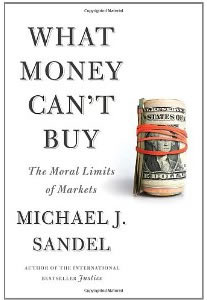Book Notes
 Michael J. Sandel, What Money Can't Buy; The Moral Limits of Markets (New York: Farrar, Straus, Giroux, 2012), 244pp.
Michael J. Sandel, What Money Can't Buy; The Moral Limits of Markets (New York: Farrar, Straus, Giroux, 2012), 244pp.
Michael Sandel's previous book, Justice: What's the Right Thing to Do? (2009), was an international best-seller. Based upon a popular course that he's taught at Harvard for over twenty years, the book was featured in series by both the BBC and PBS. Like that book, What Money Can't Buy tackles complicated issues with clear prose and everyday examples. Sandel laments how markets and market values have triumphed over all other competing values. In the last thirty years, he says, we've gone from "having" markets to "being" a market.
Today you can buy and sell almost anything. Immigrants can buy permanent residence in the US if they invest $500,000 and create ten jobs in areas of high unemployment. Lobbyists in Washington, DC, pay line-standers to secure seats at congressional hearings. School districts pay children for academic performance. Project Prevention pays women drug addicts $300 cash if they agree to sterilization or long-tern birth control. In so-called janitors insurance, corporations like Walmart buy life insurance policies on their employees, often without their knowledge, and then collect the pay outs when they die. One author received an undisclosed sum for mentioning the word "Bulgari" in his book a certain number of times.
How did we get to this point? Traditional economics ignore or oppose ethical values. Some people argue that unregulated markets are the best means to all public ends. Ayn Rand still commands a wide readership. She criticized self-sacrifice for the public good as the greatest sin, and commended radical individualism and selfishness as the greatest virtues. These trends are aggravated by two factors, says Sandel — the persistent prestige of market thinking despite the devastation of the 2008 crash, and "the rancor and emptiness of our public discourse," along with "the moral vacancy of contemporary politics." Sandel's book tries to reconnect markets and morals.
But what's wrong if a person wants to sell a kidney for much-needed money, a homeless person sells his blood to the blood bank, or if a rich corporation buys naming rights to a stadium built with public tax dollars? Is it wrong for a corporation to benefit from the death of its janitor? Sandel argues by analogy from the clear to the more complex and controversial. It's clear, for example, that we can't, don't and shouldn't commodify everything, like human beings (slavery), votes, love, or friendship. Mere economic utility is reductionistic and doesn't capture our broader human experience.
Sandel responds to economic utilitarianism in two broad ways. One objection has to do with fairness: "In a society where everything is for sale, life is harder for those of modest means. The more money can buy, the more affluence (or the lack of it) matters." Second, in some instances, money corrupts, distorts, and degrades its object, which is probably why, to take one of his examples, citizens in a Swiss village volunteered to accept nuclear waste as a civic duty, but refused to do that when offered money (it felt like a bribe).
Sandel admits that these are complex and controversial questions. There are grey areas. Some times there's no clear answer. "In the end, the question of markets is really a question about how we want to live together. Do we want a society where everything is up for sale? Or are there certain moral and civic goods that markets do not honor and money cannot buy?"


